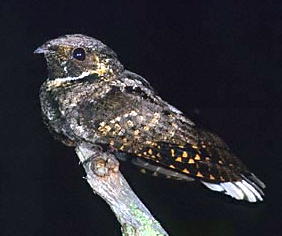SUNNY CAL JOURNAL - Whippoorwills Are Home Again

By Bob Weaver
The Whippoorwills returned to Calhoun in the early 2000s, their calls echoing from a distance across the hills.
They have returned to the Village of Hur.
They are timed for the same week.
While fading from the backwoods of Calhoun, the bird has returned these past few years, a harbinger of Spring.
It has been a ritual here in Hur to climb the knoll beside the house and listen to their night calls, or drive to a higher hill to hear their echoes, near and far away.
Last night, with bedroom windows opened, they came to the yard for a special serenade, awakening us from a deep sleep.
Their call is considered mournful and lonesome by some, but it also tells of that delightful time when the earth comes alive and planting season is upon us.
The Ute Indians believed that the whippoorwill was the "god of the night," while other folk legends said an unmarried women would listen for a call of the whippoorwill.
One call meant she won't get married for a year. Three calls meant she will be destined to be a spinster. Two calls meant impending matrimony.
The whippoorwill song belongs with balmy nights in late April and early May, most usually under moon light, with blossoms yet to lose their perfume and farm work yet to begin.
Their eggs, laid on the ground among the leaves, hatch on full moon nights.
The whippoorwill has often been used in literature and music, certainly made famous by Hank William's country tune "I'm So Lonesome I Could Cry."
Hear that lonesome whippoorwill
He sounds too blue to fly
The midnight train is whining low
I'm so lonesome I could cry
I've never seen a night so long
When time goes crawling by
The moon just went behind the clouds
To hide its face and cry
Did you ever see a robin weep?
When leaves begin to die
Like me he's lost the will to live
I'm so lonesome I could cry
Then there is Stephen Vincent Benet's "The Mountain Whippoorwill"(Or, How Hill-Billy Jim Won the Great Fiddlers' Prize):
Up in the mountains, it's lonesome all the time,
(Sof' win' slewin' thu' the sweet-potato vine.)
Up in the mountains, it's lonesome for a child,
(Whippoorwills a-callin' when the sap runs wild.)
Up in the mountains, mountains in the fog,
Everythin's as lazy as an old houn' dog.
Born in the mountains, never raised a pet,
Don't want nuthin' an' never got it yet.
Born in the mountains, lonesome-born,
Raised runnin' ragged thu' the cockleburrs and corn.
Never knew my pappy, mebbe never should.
Think he was a fiddle made of mountain laurel-wood.
Never had a mammy to teach me pretty-please.
Think she was a whippoorwill, a-skittin' thu' the trees.
We are grateful to have them back.